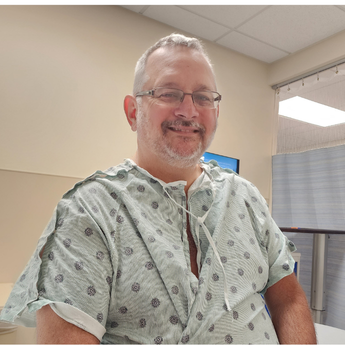A breast cancer diagnosis comes with so many questions and there never seems to be enough time at appointments to have some of these questions answered. To help address this, we developed a "Q&E: Questions and Experts" series. In this series, a variety of experts spend the entire virtual session answering pre-submitted and live questions from participants. Watching the videos on-demand might be a little difficult to get through. So, we’ve created this guide to help you get right to the questions and answers that matter the most to you.
In today’s post, we provide the questions that were sent in and asked during the live session of our Questions and Experts series held on February 7th, 2023. In this session, clinical psychologist Dr. Karen Fergus answered questions about the mental health impacts of a breast cancer diagnosis. In the parentheses, you’ll find the timestamp of where to find the question in the on-demand video.
Resources
- I give a copy of a book called Wherever You Go, There You Are by Jon Kabat-Zinn to everyone I know who is newly diagnosed. Have you heard about this book and are you able to comment on it or on other resources that you think are a must for breast cancer patients? (2:42)
- How does one actually go about finding a psychologist? (40:54)
- I find it hard to read support books sometimes, do you have any resources that are not books? (1:15:22)
Coping Strategies
- Do you have any strategies for living with the uncertainty of a metastatic breast cancer diagnosis? (15:20)
- I would like to be a more active participant in my life and not feel like I'm just existing. What steps can I take to address this? (44:55)
- Is there a name for that period or feeling after treatments where I felt hopeful and euphoric after my initial anger and fear? I made changes in my life accordingly but then those feelings faded and now things seem worse. (50:35)
- Do you have any suggestions for managing the stress of breast cancer when my husband and other family relatives do not offer any emotional or physical support? (21:00)
- What are some tips or steps for incorporating some of the advice you’ve talked about today into daily life? (1:18:23)
Medications
- How do I deal with my medications that have caused depression? (1:10:22)
- I'm on anxiety medication already and I have stage IV breast cancer. With each new treatment I find I have increasing anxiety and trouble sleeping; how do I discuss this with my oncologist? (9:40)
Anxiety and Depression
- I'm on anxiety medication already and I have stage IV breast cancer. With each new treatment I find I have increasing anxiety and trouble sleeping; how do I discuss this with my oncologist? (9:40)
- How does someone who is post-treatment deal with the anxiety that comes with the fear of recurrence? (33:28)
- I feel like I'm going to go crazy waiting for my mammogram and test results every year; how do I cope with that anxiety? (56:23)
- How do I deal with my medications that have caused depression? (1:10:22)
Communicating and Relating
- Do you think society has a big impact on how we relate to someone who has a cancer diagnosis? (1:04:42)
- How can I respond to, or deal with people who seem to lose interest in how well I’m doing over time? How do I show that I need help after an initial breast cancer diagnosis or later when in post-treatment? (58:40)
- Do you have any suggestions for managing the stress of breast cancer when my husband and other family relatives do not offer any emotional or physical support? (21:00)
Emotional Impacts
- Do breast cancer patients go through different psychological stages over set periods of time, like emotional milestones? (37:55)
- I have a close friend who was going through a breast cancer diagnosis at the same time (as myself), and that friend is now stage IV metastatic; how can I best help her and deal with my feelings of survivor’s guilt at the same time? (1:12:33)
- How would I deal with the fear of germs while going through chemotherapy and having children? (18:16)
- I'm having trouble letting go of my anger about my diagnosis and all the treatments, and how the medical system treats cancer. How can I cope with my feelings? (27:49)
- How does someone who is post-treatment deal with the anxiety that comes with the fear of recurrence? (33:28)
Resources
Mindfulness-Based Cancer Recovery: A Step-by-Step MBSR Approach to Help You Cope with Treatment and Reclaim Your Life (2011) by Linda Carlson, PhD RPsych and Michael Speca, PsyD RPsych.
The Complete Guide to Breast Cancer: How to Feel Empowered and Take Control (2018) by Professor Trisha Greenhalgh and Dr. Liz O'Riordan.
Life, Lemons and Melons (2019) by Alice-May Purkiss.
Picking Up the Pieces: Moving Forward After Surviving Cancer (2006), by Sherri Magee and Kathy Scalzo.
Sleep Through Insomnia: End the Anxiety and Discover Sleep Relief with Guided CBT-I Therapy, by Brandon R. Peters, M.D.
Quiet Your Mind and Get to Sleep: Solutions to Insomnia for Those with Depression, Anxiety, or Chronic Pain (New Harbinger Self-Help Workbook), Kindle edition by Colleen E. Carney and Rachel Manber.
https://insomnia-free.com/
https://cancer.ca/en/living-with-cancer/coping-with-changes/family-life
Guides to Understanding Anxiety and Depression with resources:
https://www.cancercareontario.ca/en/symptom-management







